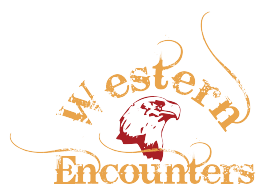|
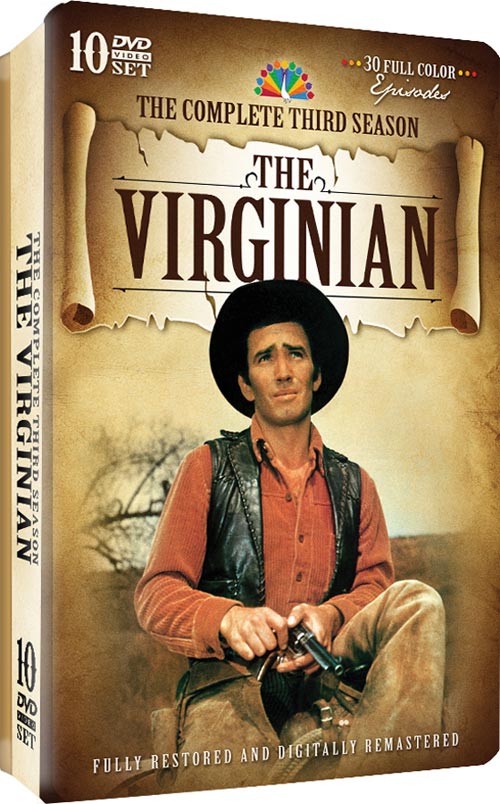
|
|
The Virginian 1962-1971
James Drury, Doug McClure, Lee J. Cobb & Clu Gulager
The Virginian is an American Western television series that aired on NBC from 1962 to 1971 for a total of 249 episodes. It was the first Western to air in 90-minute installments each week (75 minutes excluding commercial breaks),[1] and was filmed in the color format from its inception. It remains the third longest running TV western, with nine seasons and 249 episodes. It follows Bonanza at fourteen seasons and 430 episodes, and Gunsmoke at twenty seasons and 635 episodes
To see list of all 249 episodes of the Virginian and the plot summaries, please click here.
|
|
|
|
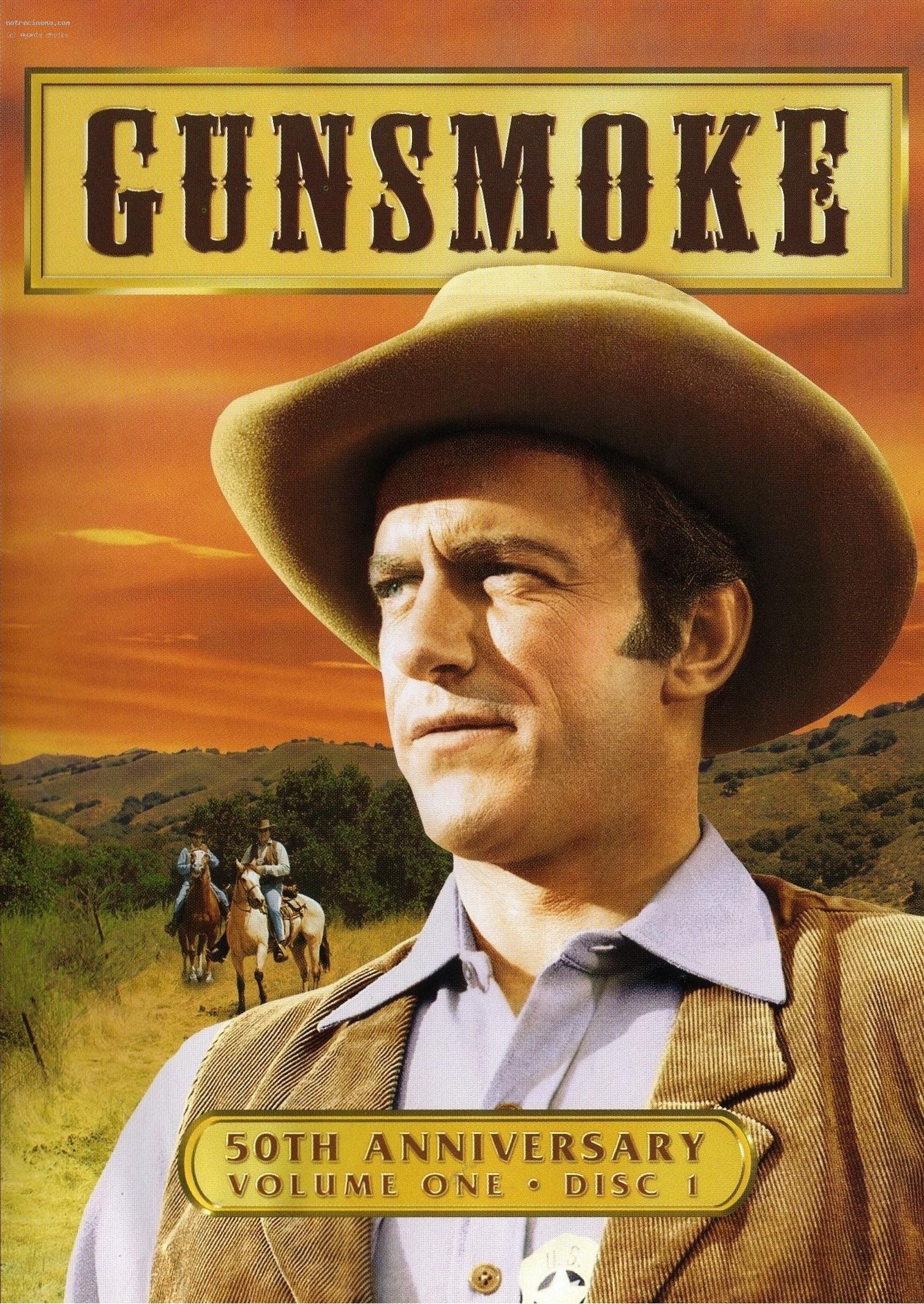
|
|
Gunsmoke 1962-1971
James Arness, Dennis Weaver, Amanda Blake & Milburn Stone
Gunsmoke is an American radio and television Western drama series created by director Norman MacDonnell and writer John Meston. The stories take place in and around Dodge City, Kansas, during the settlement of the American West. The radio version ran from 1952 to 1961, and John Dunning writes that among radio drama enthusiasts "Gunsmoke is routinely placed among the best shows of any kind and any time." The television version ran for 20 seasons from 1955 to 1975, and was the United States' longest-running prime time, live-action drama with 635 episodes. In 2010 Law & Order tied this record of 20 seasons (but only 456 episodes). At the end of its run in 1975, Los Angeles Times columnist Cecil Smith wrote "Gunsmoke was the dramatization of the American epic legend of the west. Our own Iliad and Odyssey, created from standard elements of the dime novel and the pulp western as romanticized by Buntline, Harte, and Twain. It was ever the stuff of legend."
|
|
|
|
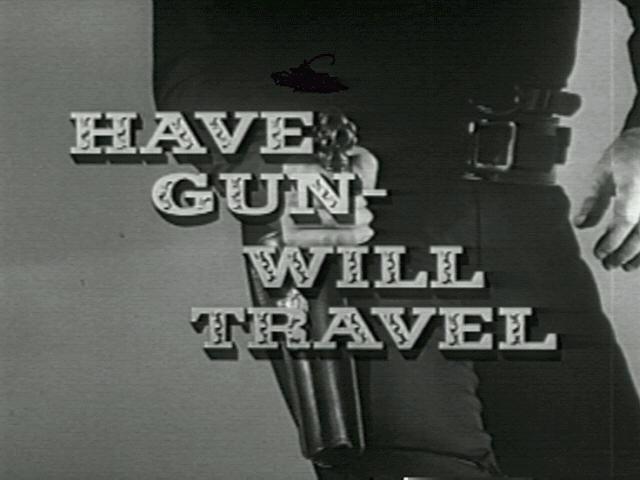
|
|
Have Gun Will Travel -1957 - 1963
Richard Boone
The show followed the adventures of "Paladin" (In episode 139 "Fandango" the sheriff “Ernie Backwater” shakes Paladin's hand and calls him Bobby), a gentleman gunfighter (played by Richard Boone on television, and by John Dehner on radio), who preferred to settle problems without violence; yet, when forced to fight, excelled. Paladin lived in the Hotel Carlton in San Francisco, where he dressed in formal attire, ate gourmet food, and attended the opera. In fact, many who met him initially mistook him for a dandy from the East. But when working, he dressed in black, carried a derringer under his belt, used calling cards with a chess knight emblem, and wore a stereotypical western-style black gunbelt with the same chess knight symbol attached to the holster.
|
|
|
|
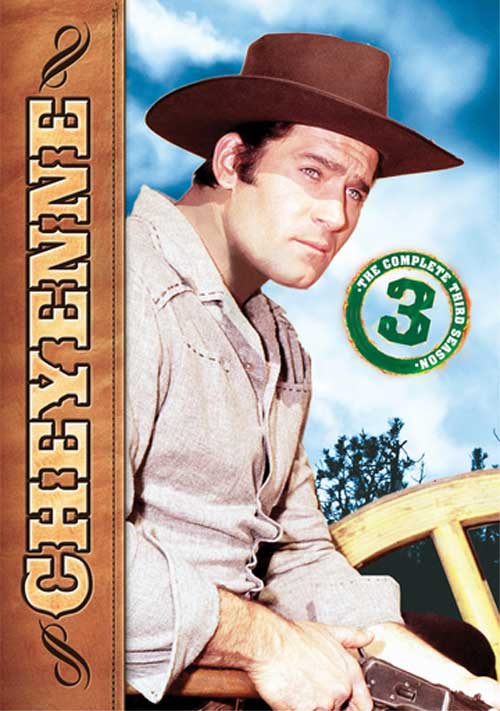
|
|
Cheyenne Bodie 1955 - 1963
Clint Walker
Cheyenne is a western television series of 108 black-and-white episodes broadcast on ABC from 1955 to 1963. The show was the first hour-long western, and in fact the first hour-long dramatic series of any kind, with continuing characters, to last more than one season. It was also the first series to be made by a major Hollywood film studio which did not derive from its established film properties, and the first of a long chain of Warner Brothers original series produced by William T. Orr. . The show starred Clint Walker, a native of Illinois, as Cheyenne Bodie, a physically large cowboy wandering the American West. The first episode, about robbers pretending to be Good Samaritans, is entitled "Mountain Fortress" and features James Garner as a guest star. The episode reveals that Bodie's parents were massacred by Cheyenne Indians, who then reared him. Bodie maintained a positive and understanding attitude toward the Native Americans.
|
|
|
|
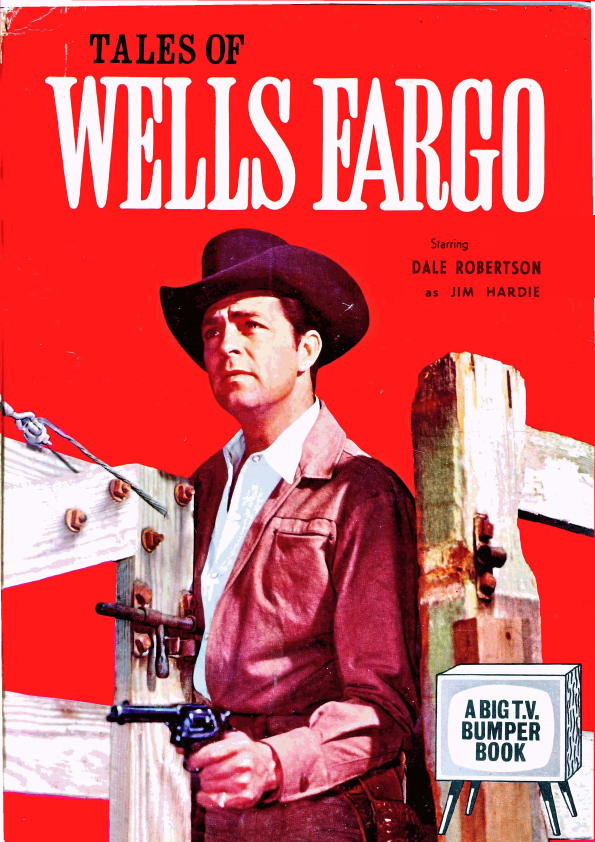
|
|
The Tales of Wells Fargo 1957 - 1962
Dale Robertson, William Demarest & Kit Carson
Agent Jim Hardie shifts over its history from being mostly an agent helping Wells Fargo cope with badguys to being the owner of a ranch near San Francisco who still does some agent work.
Set in the mid-19th century, the series starred Dale Robertson as special agent Jim Hardie, noted at the time as "the left-handed gun". The concept of the Wells Fargo series, a company troubleshooter in the American West, was also adapted by the syndicated series Pony Express, co-starring Robert Ivers, which ran in the 1959-1960 season, nearly coinciding with the centennial of the Pony Express.
|
|
|
|
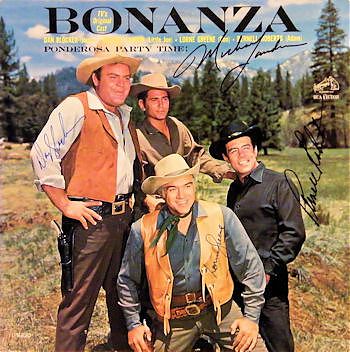
|
|
Bonanza 1959 - 1973
Lorne Green, Pernell Roberts, Dan Blocker, Michael Landon
Bonanza is an American western television series that ran on NBC from September 12, 1959 to January 16, 1973. Lasting 14 seasons and 431 episodes, it ranks as the second longest running western series (behind Gunsmoke) and continues to air in syndication. The show stars Lorne Greene, Pernell Roberts, Dan Blocker, Michael Landon, and David Canary. In 2002, Bonanza was ranked #43 on TV Guide's 50 Greatest TV Shows of All Time. The show chronicled the weekly adventures of the Cartwright family, headed by the thrice-widowered patriarch Ben Cartwright (played by Lorne Greene). He had three sons, each by a different wife: the eldest was the urbane architect Adam Cartwright (played by Pernell Roberts) who built the ranch house; the second was the warm and lovable giant Eric, "Hoss" (played by Dan Blocker); and the youngest was the hotheaded and impetuous Joseph or "Little Joe" (played by Michael Landon).
|
|
|
|
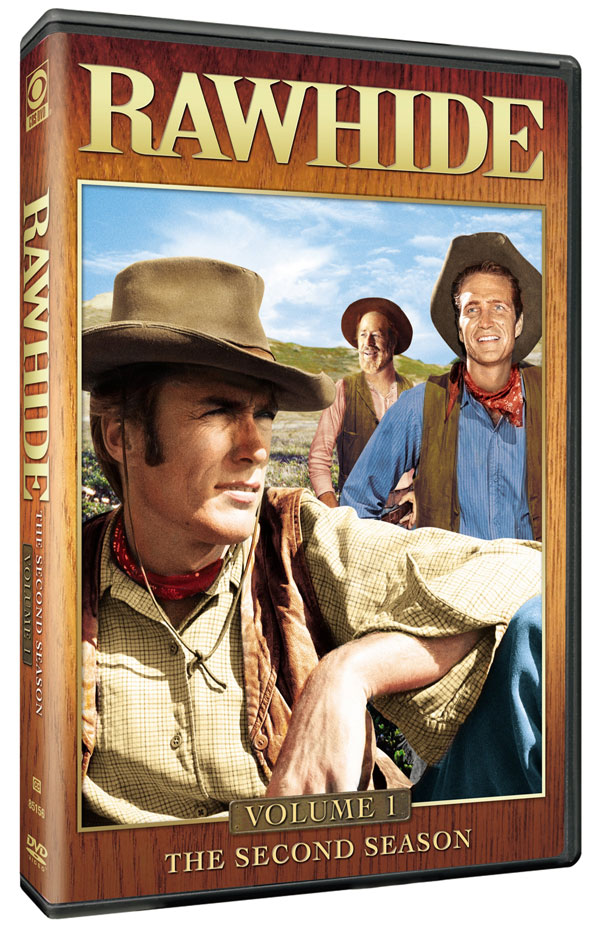
|
|
Rawhide 1959 - 1965
Erif Fleming, Clint Eastwood
Rawhide is an American Western series that aired for eight seasons on the CBS network on Friday nights, from January 9, 1959[1] to September 3, 1965, before moving to Tuesday nights from September 14, 1965 until January 4, 1966, with a total of 217 black-and-white episodes. Starring Eric Fleming and Clint Eastwood, the series was produced and sometimes directed by Charles Marquis Warren who also produced early episodes of Gunsmoke.
Spanning seven and a half years, Rawhide was the fifth-longest-running American television Western, beaten only by eight years of Wagon Train, nine years of The Virginian, fourteen years of Bonanza, and twenty years of Gunsmoke. Set in the 1860s, Rawhide portrays the challenges faced by the men of a cattle drive. There are 20-25 riders looking after 3,000 head of cattle. Gil (short for Gilbert Favor, episode 181) revealed this is about the maximum manageable size for a herd of cows. The cattle drive begins in San Antonio, Texas, and makes its way along the Sedalia Trail (Sedalia, the final destination, is in Missouri about 50 miles east from Kansas City).
|
|
|
|
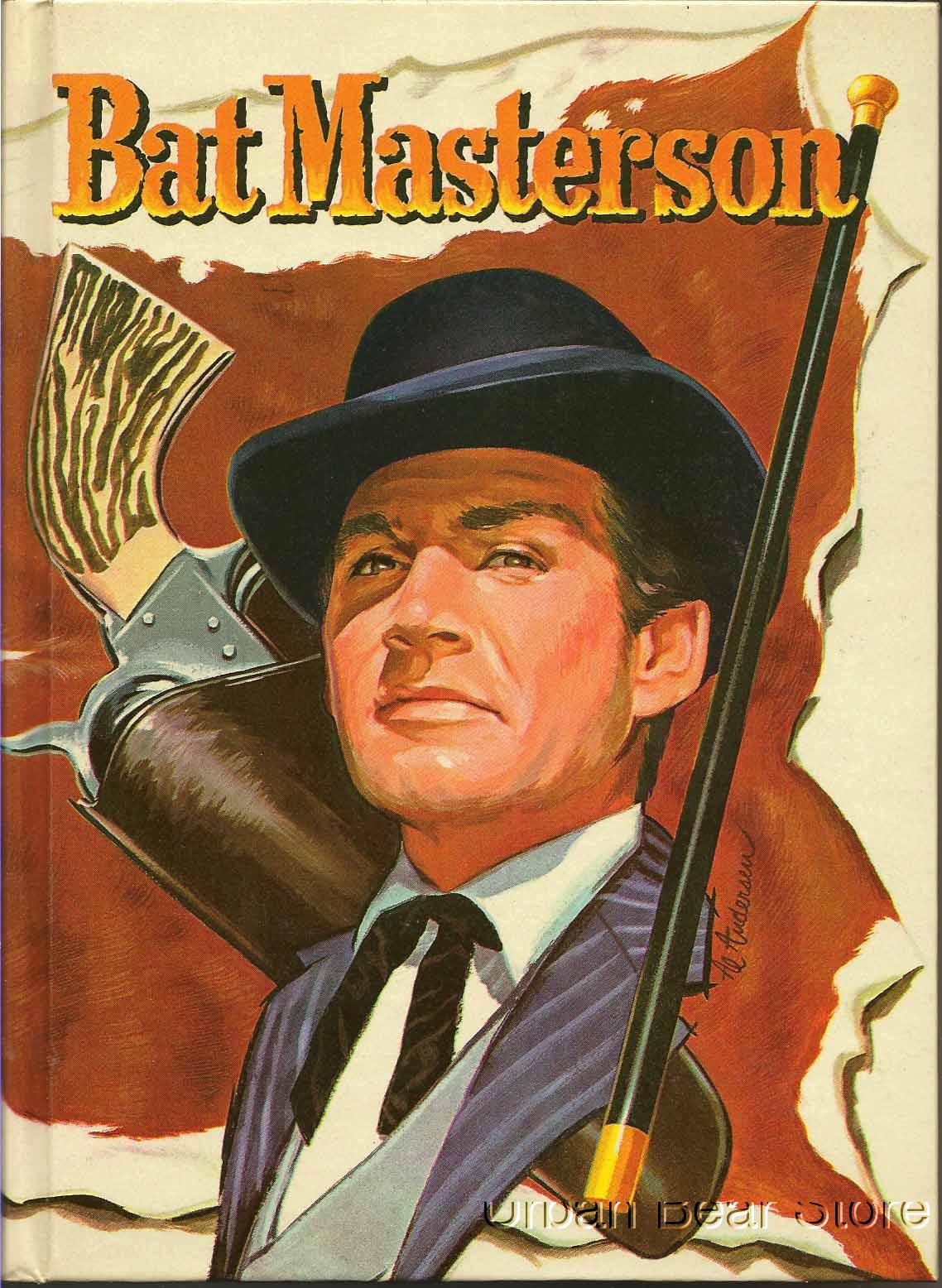
|
|
Bat Masterson 1958 - 1961
Gene Barry
Bat Masterson is an American Western television series which showed a fictionalized account of the life of real-life marshal/gambler/dandy Bat Masterson. The title character was played by Gene Barry and the half-hour black and white shows ran on NBC. It was produced by Ziv Television Productions, the company responsible for such hit series as Sea Hunt and Highway Patrol.The show took a tongue-in-cheek outlook, with Barry's Masterson often dressed in expensive Eastern clothing and preferring to use his cane rather than a gun to get himself out of trouble, hence the nickname "Bat". Masterson was also portrayed as a ladies' man who traveled the West looking for women and adventure. The black derby, fancy vest, black jacket, and elegant cane were his trademarks. Miniaturized versions were marketed to children as tie-in products during the run of the show. The theme song was sung by Mike Stewart, who had previously contributed to a children's album in 1956, Walt Kelly's Songs of the Pogo.
The series was loosely based on Richard O'Connor's 1957 biography of Masterson.
|
|
|
|
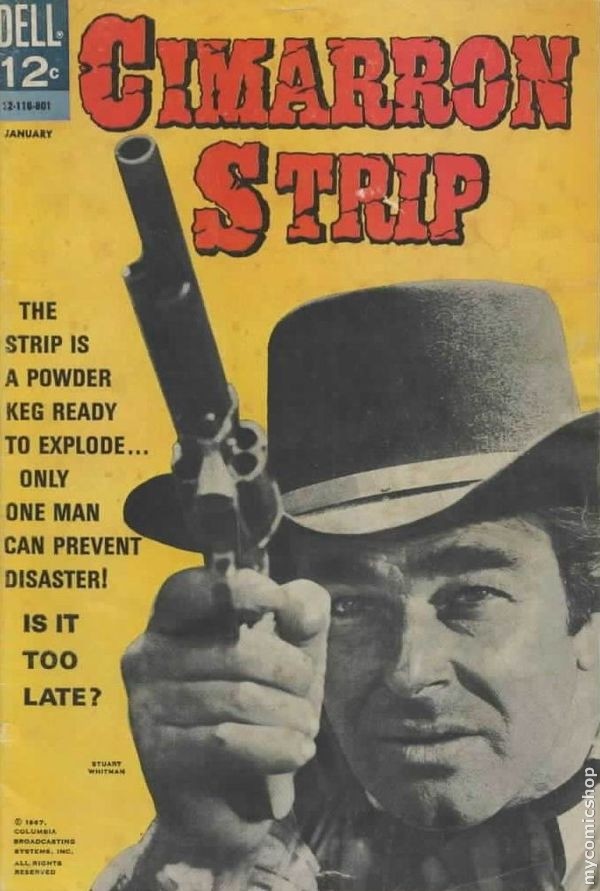
|
|
Cimarron Strip 1967 - 1968
Stuart Whitman
Cimarron Strip is an American Western television series that aired on CBS. Starring Stuart Whitman as Marshal Jim Crown, the series was produced by the creators of Gunsmoke.
Cimarron Strip was one of only three 90 minute weekly Western series that aired during the 1960s (the others being The Virginian and, for one season, Wagon Train), and the only 90 minute series of any kind to be centered primarily around one lead character. Cimarron Strip was set in the Oklahoma Panhandle, which comprises, east to west, Beaver, Texas, and Cimarron counties. The show is set in 1888, just as the continuous frontier of the West, which once ran from the Canadian to the Mexican border, was closing
|
|
|
|
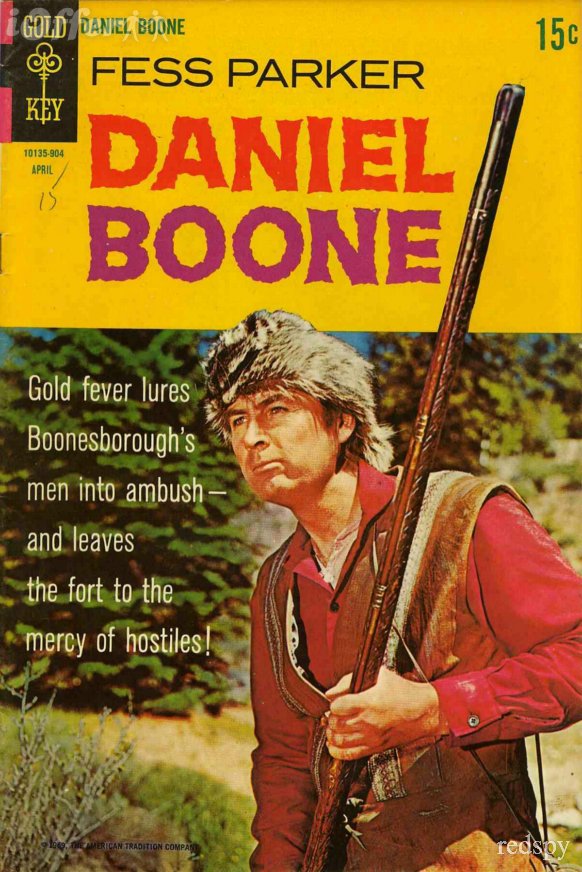
|
|
Daniel Boone 1964 - 1970
Fess Parker
is an American action/adventure television series starring Fess Parker as Daniel Boone that aired on NBC for 165 episodes, and was made by 20th Century Fox Television. Ed Ames co-starred as Mingo, Boone's Native American friend, for the first four seasons of the series. Albert Salmi portrayed Boone's companion Yadkin in season one only. Dallas McKennon portrayed innkeeper Cincinnatus. Daniel Boone was one of two iconic historical figures played by Fess Parker. He previously appeared as Davy Crockett in a series of episodes of the Walt Disney anthology television series, to considerable acclaim amidst the launch of a national craze. For his role as Boone, which lasted much longer but had far less impact, Parker again wore a raccoon-hide coonskin cap, which had been popularized years earlier by the Crockett shows. The real life Daniel Boone did not actually wear a coonskin cap. Efforts had been made to secure the rights to Crockett from Walt Disney but he refused to sell, so the series wound up being about Boone instead.
|
|
|
|
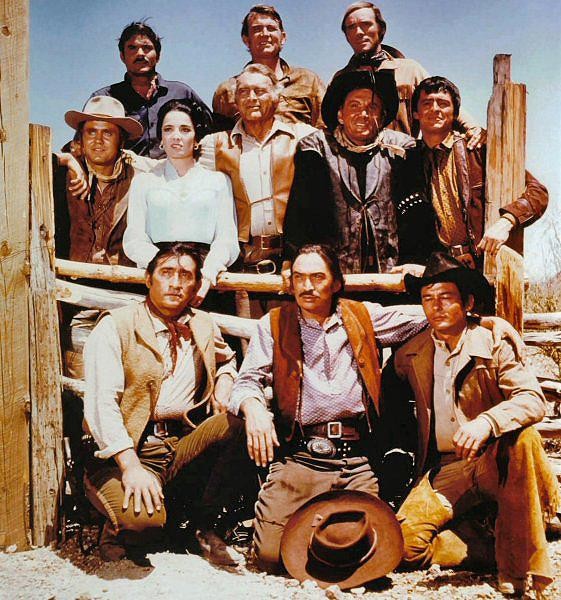
|
|
The High Chaparral 1962-1971
Leif Erickson, Cameron Mitchel, Mark Slade, Henry Darrow & Linda Cristal.
The High Chaparral is a Western-themed television series which aired on NBC from 1967 to 1971. The show was created by David Dortort, who had previously created the hit Bonanza for the network. The theme song was also written and conducted by Bonanza scorer David Rose.
Cast and characters. The show revolved around "Big" John Cannon (Leif Erickson), a rancher who lived in the Arizona Territory in the 1870s. He ran the ranch with his brother Buck (Cameron Mitchell) and son Billy (Blue Boy) (Mark Slade). Blue Boy's mother Annalee (Joan Caulfield) was killed in the first episode by an Indian arrow through the window, and to ensure his future, John Cannon courted and later married Victoria (Linda Cristal), the daughter of the powerful Don Sebasti�n Montoya. His marriage to Victoria Montoya brought her brother Manolito (Henry Darrow) into the picture, and he also came to live with the family. Cameron Mitchell was offered the part of Buck following an airline flight to Tucson where he had sat next to the series originator and his wife.
|
|
|
|
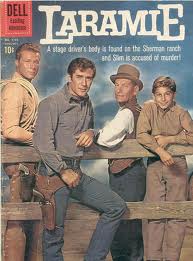
|
|
Laramie 1959 - 1963
Robert Fuller & John Smith
It is the 1870s in Wyoming Territory. Slim Sherman and his 14-year-old brother Andy try to hang on to their ranch after their father is shot by a land grabber. They augment their slight cattle ranch income by serving as a stagecoach station near Laramie. The brothers were helped by their father's long time friend named Jonsey who was their cook and house keeper and helped run the relay station. One day a stranger and drifter named Jess Harper rides onto the ranch and Andy Sherman takes to him immediately. Jess and Slim quickly form a dislike for one another and almost come to blows. The arrival and departure of a gang of outlaws interrupts their fight. At the urging of young Andy Jess helps Slim subdue the leader and the gang. Slim asks Jess to stay on and work at the ranch. Which Jess reluctantly accepts. Thus began the saga of the unforgettable friendship of Jess and Slim. played brilliantly by Robert Fuller (Jess) and John Smith (Slim) that was unmatched by any series of the time or since
|
|
|
|
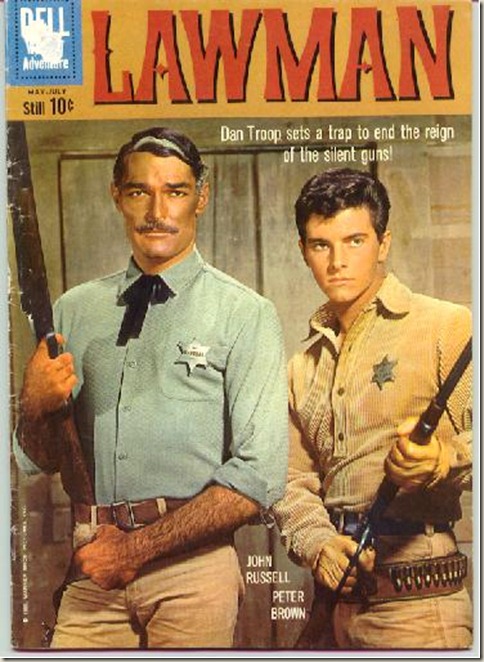
|
|
Lawman 1958 - 1962
John Russell & Peter Brown
Lawman is the story of Marshal Dan Troop of Laramie, Wyoming and his deputy Johnny McKay an orphan Troop took under his wing. In the second season Lily Merrill opens The Birdcage Saloon where she sings and entertains and has a close unspoken relationship with Troop.
|
|
|
|
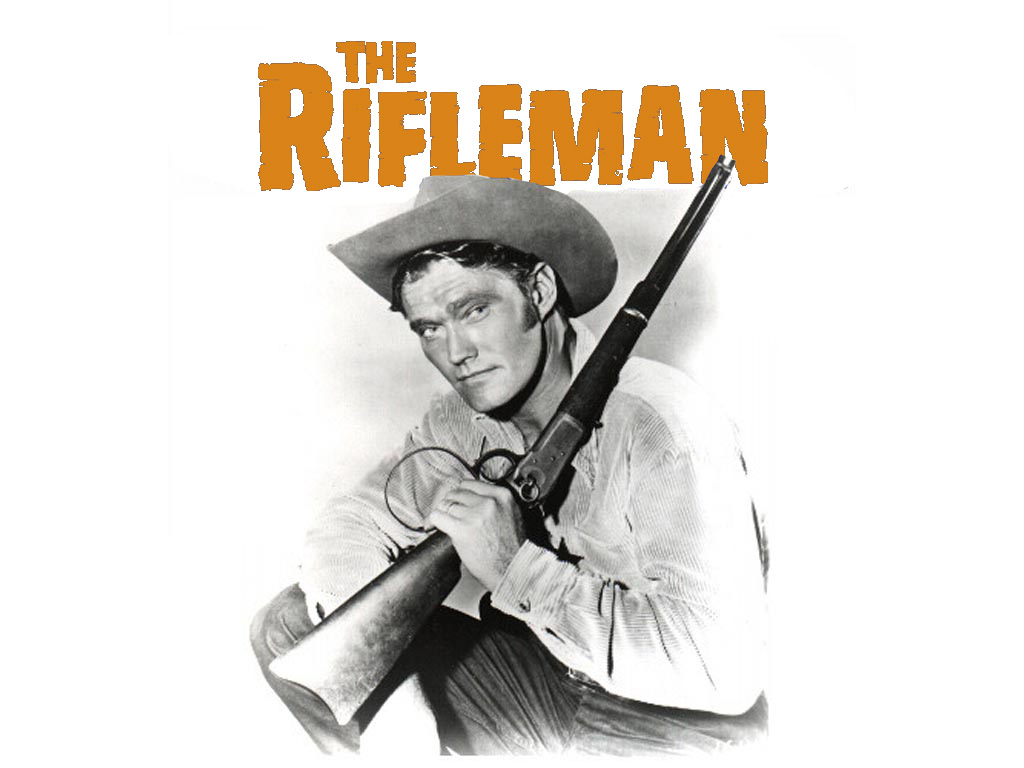
|
|
Rifleman 1958-1963
Chuck Connors & Johnny Crawford.
The Rifleman is an American Western television program that starred Chuck Connors as homesteader Lucas McCain and Johnny Crawford as his son, Mark McCain. It was set in the 1880s in the town of North Fork, New Mexico Territory. The show, filmed in black-and-white, ran on ABC, from September 30, 1958 to April 8, 1963, a production of Four Star Television. It was also one of the first primetime series ever to have a widowed parent raise a child.
Westerns were popular when The Rifleman premiered, and producers struggled to find gimmicks to distinguish one show from another. The Rifleman's gimmick was a modified Winchester Model 1892 rifle with a trigger mechanism allowing for rapid-fire shots. Despite the anachronism, Connors demonstrated its rapid-fire action during the opening credits as McCain dispatched an unseen villain on North Fork's main street. Although the rifle may have appeared in every episode, it was not always fired, as some plots did not lend themselves to violent solutions, McCain was also well versed in the use of a six gun although he did not own one and this aspect was rarely shown.
|
|
|
|
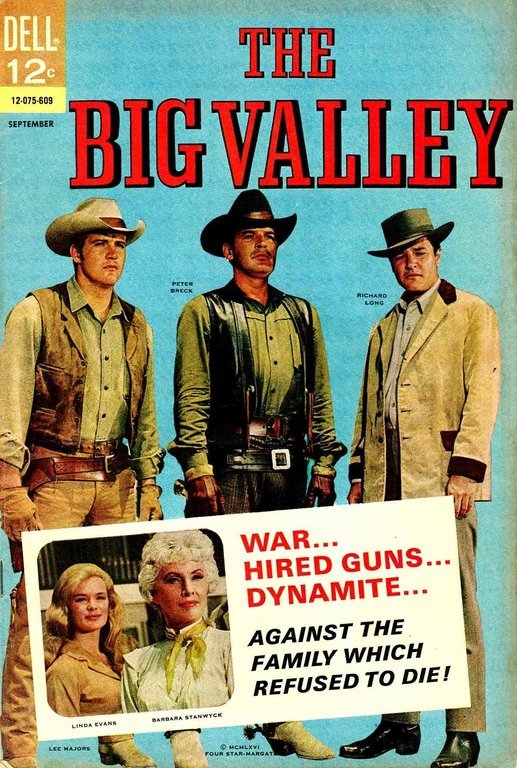
|
|
The Big Valley 1965 - 1969
Barbara Stanwyck, Richard Long, Peter Breck, Lee Majors, Linda Evans
Barkley heads her adult brood on the Barkley Ranch in California's San Joaquin Valley, near Stockton, in the 1870s. Heath is the illegitimate son of Victoria's husband, Tom (who is dead at the time of the series). Bank robbers, horse thieves, revolutionaries, and land grabbers keep the Barkleys hopping
|
|
|
|
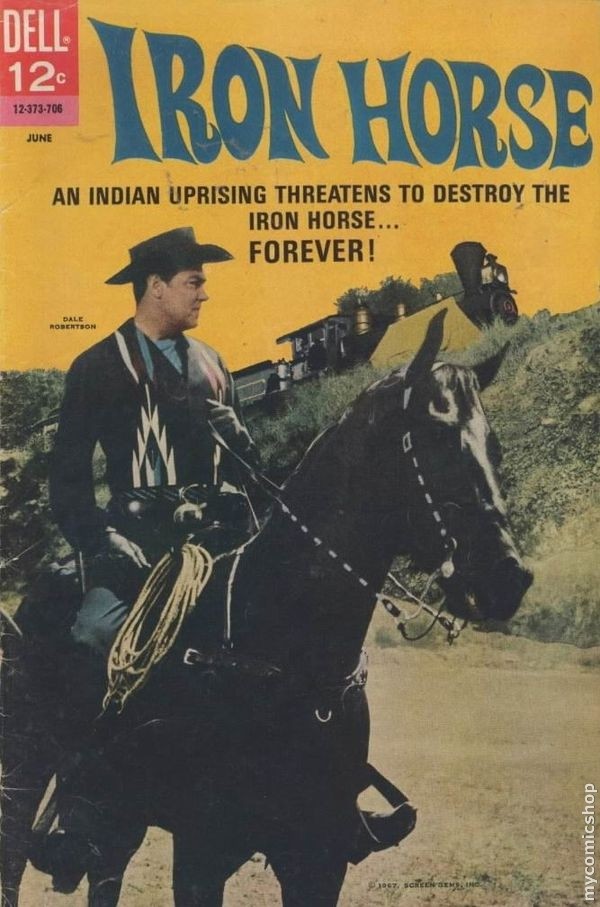
|
|
The Iron Horse 1966 - 1968
Dale Robertson, Gary Collins & Ellen Burstyn
The Iron Horse is an American Western television series that appeared on ABC. It featured Dale Robertson as fictional gambler-turned-railroad baron Ben Calhoun. .The plot centered on Calhoun's poker game-win of the incomplete Buffalo Pass, Scalplock, & Defiance Railroad and his wide-ranging attempts to finish the line despite obstacles that were ever-present.
Much of the external footage involving trains was shot on the historic Sierra Railroad in and around Jamestown and Sonora, California, and the filming was produced by Screen Gems.
In its first season, The Iron Horse outdistanced part of its competition on CBS, Run, Buddy, Run starring Jack Sheldon, which was canceled after 16 episodes.
|
|
|
|
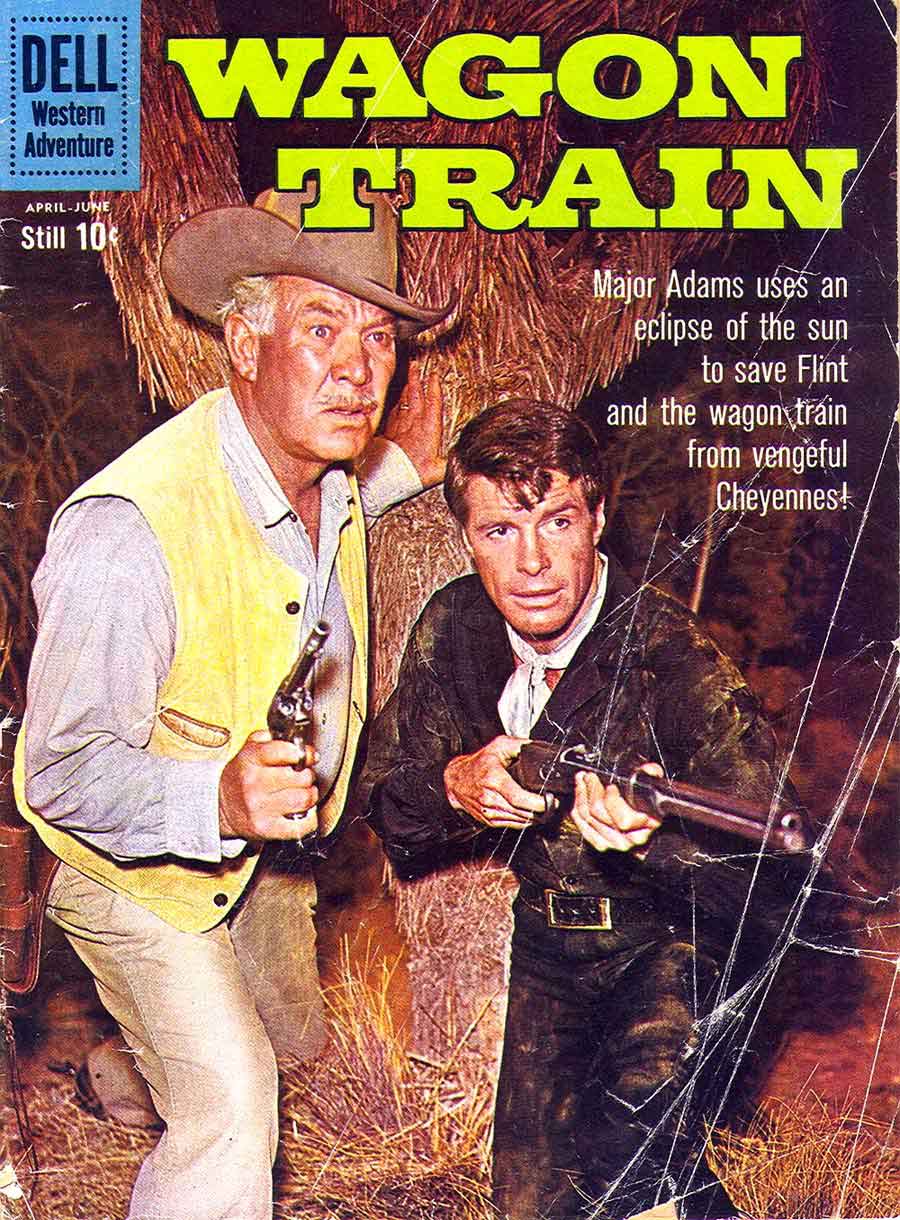
|
|
Wagon Train 1957 - 1965
John McIntire, Robert Fuller, Robert Horton.
Wagon Train is an American Western series that ran on NBC from 1957–1962 and then on ABC from 1962–1965 (the network also aired daytime repeats, as Major Adams, Trailmaster and Trailmaster [post-1961 Ward Bond episodes] from January 1963 through September 1965). The show debuted at #15 in the Nielsen ratings, rose to #2 in the next three seasons, and peaked at #1 in the 1961–1962 television season. After moving to ABC in the autumn of 1962, the ratings began to decline, and Wagon Train did not again make the Top 20 listing.
The series initially stars veteran movie supporting actor Ward Bond as the wagon master, later replaced upon his death by John McIntire, and Robert Horton as the scout, subsequently replaced by lookalike Robert Fuller a year after Horton had decided to leave the series.
|
|
|
|
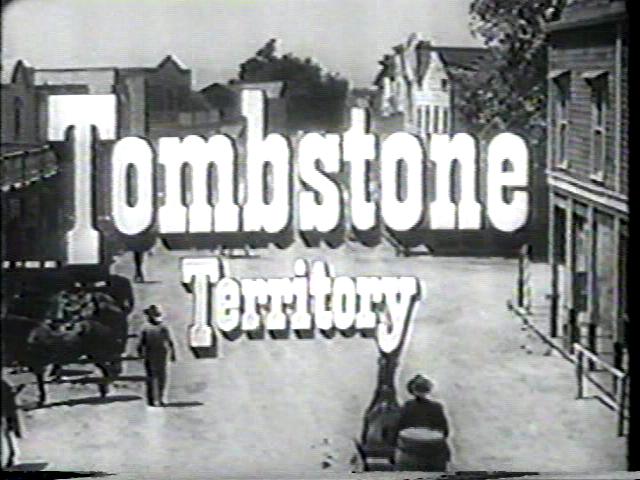
|
|
Tombstone Territory 1957 - 1960
Pat Conway & Richard Eastham
Tombstone Territory is an American Western series. The series' first two seasons aired on ABC from 1957 to 1959. The third and final season aired in syndication from 1959 until 1960. The program takes place in the boom town of Tombstone, Arizona Territory, one of the Old West's most notorious frontier towns and the site of the shootout, the Gunfight at the O.K. Corral. Located south of Tucson, Tombstone was then known by the sobriquet, "the town too tough to die." The theme song, "Whistle Me Up a Memory" was composed and performed by William M. Backer.[
|
|
|
|
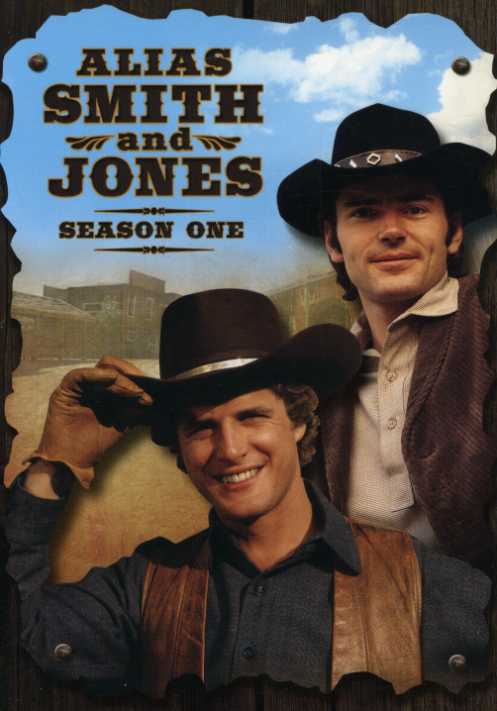
|
|
Alias Smith & Jones 1971 - 1973
Pete Duel & Ben Murphy
Alias Smith and Jones is an American Western series that originally aired on ABC from 1971 to 1973. It stars Pete Duel as Hannibal Heyes and Ben Murphy as Jedediah "Kid" Curry, a pair of Western cousin outlaws trying to reform. The deal: a promise of conditional amnesty, by a governor who wants to keep the pact under wraps. The dilemma: for now, they'll still be "wanted". Alias Smith and Jones began with a made-for-TV movie of the previous year called The Young Country, about con artists in the Old West. It was produced, written and directed by Roy Huggins, who served as executive producer of AS&J and, under the pseudonym of John Thomas James, at least shared the writing credit on most episodes.
|
|
|
|
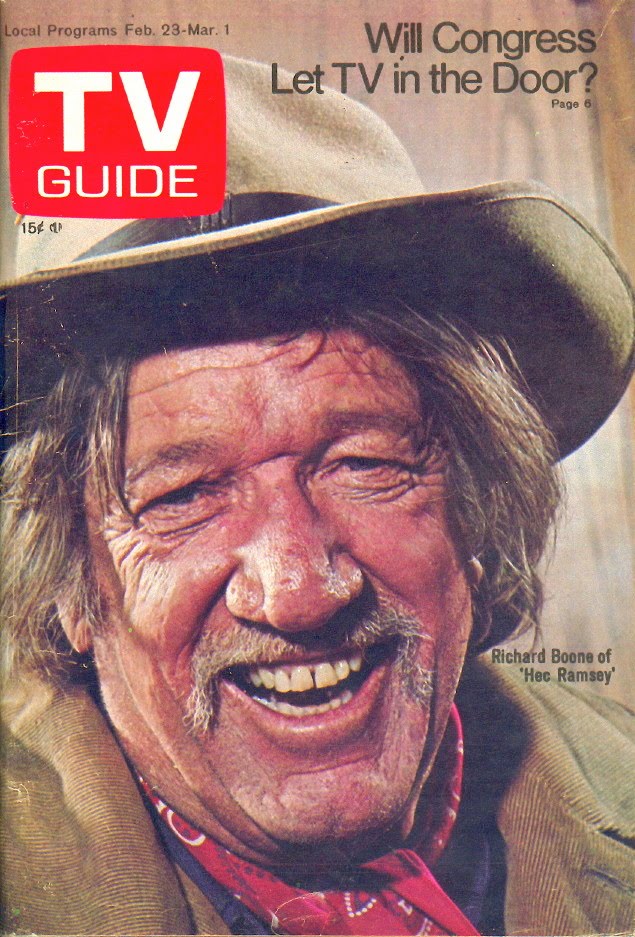
|
|
Hec Ramsey 1972 - 1974
Richard Boone
Hec Ramsey is a television Western, a production of Jack Webb's production company. This series was groundbreaking in that it was the first television Western set in the days when the Old West was fading, the end of the 19th and the beginning of the 20th century. Critics dubbed the series "Dragnet meets John Wayne", as the scripts balanced authentic investigative methods of 1900 with action and adventure. Hec Ramsey starred Richard Boone as Hector "Hec" Ramsey, who had been a gunfighter/lawman, but had developed a strong interest in the then-emerging field of forensics. He still carried a firearm, but had traded his low-slung "gunfighter" rig for a Single Action Army-type revolver with a short barrel, carried in a Cavalry draw holster. However, his most important "weapons" were now fingerprinting equipment, magnifying lenses, scales, and other equipment which allowed him to determine the real perpetrators of crimes with greater accuracy than had previously been possible.
|
|
|
|
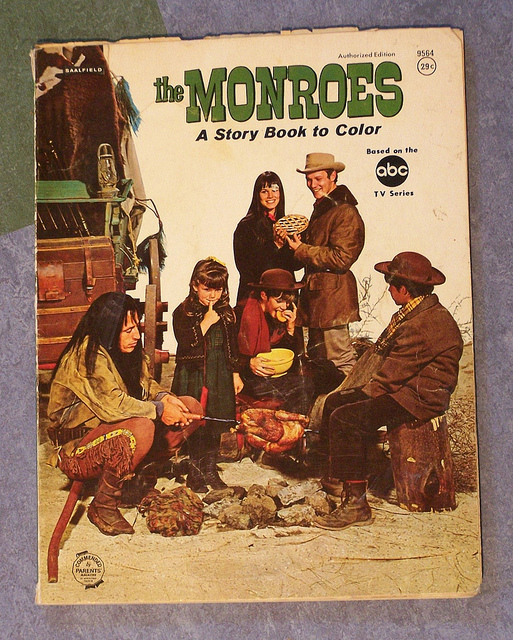
|
|
The Munroes 1966 - 1967
Michael Anderson & Barbera Hershey
The Monroes is a 26-segment Western television series which ran on ABC. The story of five orphans trying to survive as a family on the frontier in the area about what is now Grand Teton National Park near Jackson in northwestern Wyoming. Michael Anderson, Jr., then 24, played the oldest brother, Clay Monroe. Barbara Hershey, at 18, starred as sister Kathy Monroe. Other stars included Buck Taylor, prior to his role as gunsmith-turned-deputy Newly O’Brien on CBS’s Gunsmoke; Ben Johnson, who later starred in the 1971 film, The Last Picture Show, was cast as Sleeve in The Monroes. James Westmoreland portrayed Ruel Jaxon in eleven episodes, and Robert Middleton played Barney Wales in ten segments. James Brolin, later Dr. Steve Kiley on Robert Young’s Marcus Welby, M.D. series, appeared in four episodes of The Monroes. Wayne Maunder guest starred on The Monroes in a 1967 episode. This marked Maunder's first-ever screen appearance, but he used the name "Jack Wilder" until reverting thereafter to "Maunder", his actual name. Maunder later gained starring roles in two other westerns, Custer and Lancer.
|
|
|
|
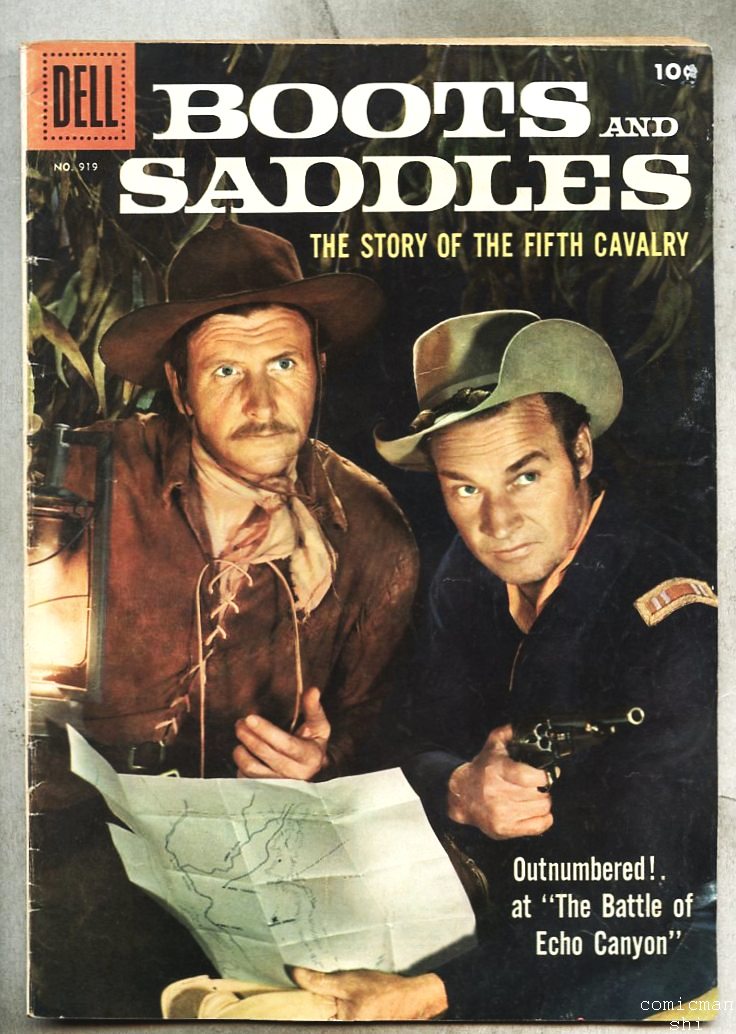
|
|
Boots and Saddles 1957 1958
Jack Pickard
Boots and Saddles is an American Western television series created by Robert A. Cinader which aired in syndication from 1957 to 1958 Set at the 19th century Fort Lowell, fictionalized in appearance, in the former Arizona Territory, near Tucson, Arizona, the series stars Jack Pickard as Captain Shank Adams, Patrick McVey as Lieutenant Colonel Wesley Hayes, and Gardner McKay as Lieutenant Dan Kelly. Other roles were filled by David Willock as Lieutenant Binning, John Alderson as Sergeant Bullock, and Mike Hinn as scout Luke Cummings. McKay later starred in the ABC series, Adventures in Paradise.
|
|
|
|
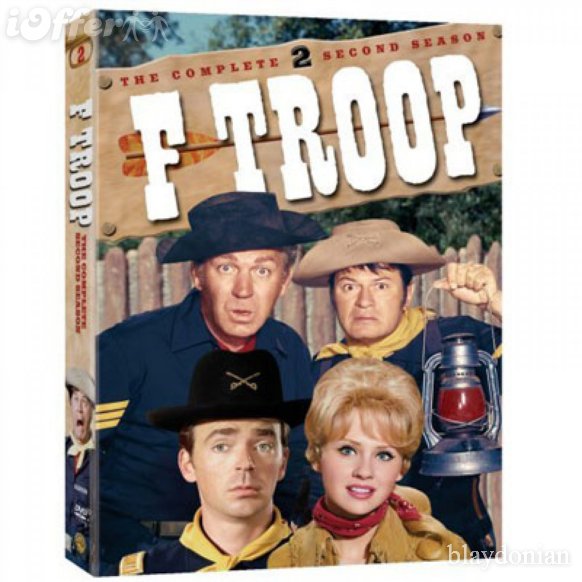
|
|
F Troop 1965 - 1967
Forrest Tucker, Ken Berry
F Troop is a satirical American television sitcom that originally aired for two seasons on ABC-TV. It debuted in the United States on September 14, 1965 and concluded its run on April 6, 1967 with a total of 65 episodes. The first season of 34 episodes was filmed in black-and-white, but the show switched to color for its second season. F Troop is set at Fort Courage, Kansas—a fictional United States Army outpost in the Old West—shortly after the American Civil War ended in 1865. There's also a town of the same name adjacent to the fort. Fort Courage was named for fictitious General Sam Courage (portrayed by Cliff Arquette), who had been in the army for forty years. As there were only four generals in the regular army before the Civil War, taking 40 years to advance to the rank of general was fairly common. The show is light on historical accuracy (e.g. the uniforms, weapons, salutes and calling a cavalry company "troop" are incorrect for the period) but heavy on character-based humor; verbal and visual gags, slapstick and burlesque comedy make up the prime ingredients of F Troop
|
|
|
|
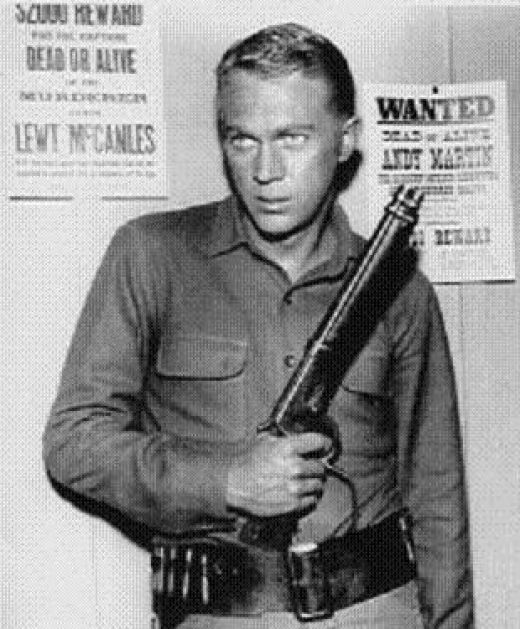
|
|
Wanted ; Dead or Alive 1958 - 1961
Steve McQueen
Wanted: Dead or Alive is an American Western television series starring Steve McQueen as the bounty hunter Josh Randall. It aired on CBS for three seasons from 1958-1961. The black-and-white program was a spin-off of a March 1958 episode of Trackdown, a 1957-1959 western series starring Robert Culp as a Texas Ranger named Hoby Gilman. Both series were produced by Four Star Television .The series launched McQueen into becoming the first television star to cross over into comparable status on the big screen. McQueen's character of Josh Randall is a Confederate veteran and bounty hunter with a soft heart. He often donates his earnings to the needy and helps his prisoners if they have been wrongly accused. Randall carries a shortened Winchester Model 1892 carbine, called the "Mare's Leg," in a holster patterned after "gunslinger" rigs then popular in movies and television.Randall had the ability to draw and fire this gun with blazing speed,as fast as , or in many cases much faster than , his adversaries with handguns that were much smaller.
|
|
|
|
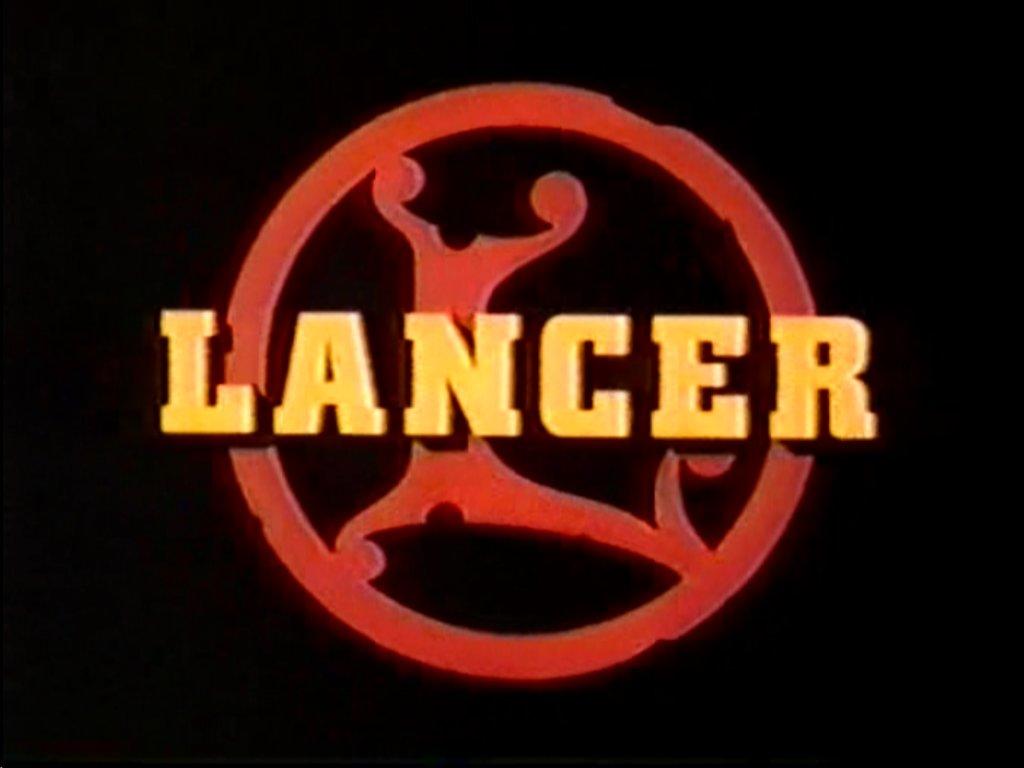
|
|
Lancer 1968 - 1970
Andrew Duggan, James Stacy & Wayne Maunder
Lancer is a 1968-1970 Western television series on CBS, which starred Andrew Duggan, James Stacy, and Wayne Maunder as a father with two half-brother sons, an arrangement similar to the more successful Bonanza on NBC. Stacy appears as half-Mexican gunslinger Johnny Madrid Lancer. Duggan plays Murdoch Lancer, a less wholly admirable patriarch than Lorne Greene's Ben Cartwright of Bonanza. Wayne Maunder, was cast as Scott Lancer, the educated older son (though he is younger than Stacy) and a veteran of the Union Army, in contrast to Stacy's role of former gunslinger. Guest stars included Joe Don Baker, Ellen Corby, Jack Elam, Sam Elliott, Bruce Dern, Ron Howard, Cloris Leachman, George Macready, Scott Marlowe, Warren Oates, Stefanie Powers, and Dub Taylor. Lancer lasted for fifty-one hour-long episodes shot in color. The program was rerun on CBS during the summer of 1971. The episode entitled "Zee" with Stefanie Powers earned scriptwriter Andy Lewis the Western Writers of America "Spur Award", the first ever designated for a television script.
|
|
|
|
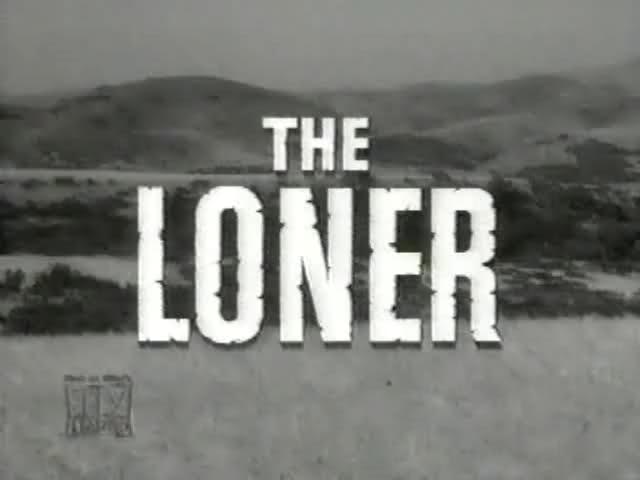
|
|
The Loner 1965 - 1966
Lloyd Bridges
The Loner is an American western series that ran for less than one season on CBS. under the alternate sponsorship of Philip Morris and Procter & Gamble. The series was set in the years immediately following the American Civil War. Lloyd Bridges played the title character, William Colton, a former Union cavalry officer who headed to the American west in search of a new life. Each episode dealt with Colton's encounters with various individuals on his trek west. Rod Serling was the series' creator. Longtime TV Guide critic Cleveland Amory wrote that Serling "obviously intended The Loner to be a realistic, adult Western," but the show's ratings indicated it was "either too real for a public grown used to the unreal Western or too adult for juvenile Easterners." In "The Homecoming of Lemuel Stove," Brock Peters played a black Union soldier returning home to see his father. The soldier made it back to his hometown only to learn his father had been lynched the previous evening by members of a Klan-like group.
|
|
|
|
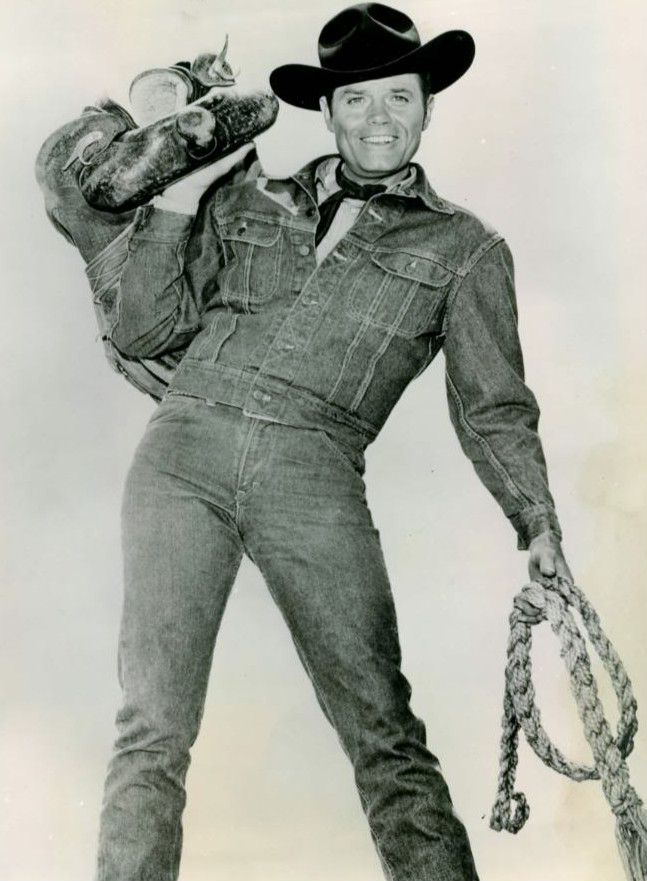
|
|
Stoney Burke 1962 - 1963
Jack Lord
Stoney Burke is a short-lived Western television series broadcast on the ABC television network from October 1, 1962 until May 20, 1963. The series starred Jack Lord, who would later go on to star in the popular television series, Hawaii Five-O. Stoney Burke was a rodeo rider who was competing for the Golden Buckle, the award given to the world champion saddle bronc rider. During his quest, Stoney became entangled in the lives of numerous people, and got into and out of trouble. After its quick cancellation, Stoney Burke has been seen in limited release.In the same season as Stoney Burke, NBC aired its own drama about rodeo performers, The Wide Country starring Earl Holliman and Andrew Prine. It ended after twenty-eight episodes. Both "Stoney Burke" and "The Wide Country" were essentially "Westerns" that had the misfortune to debut right at the end of the time when Western shows - a fixture of 1950's and early 1960's television - had been a #1 draw on the medium. Both were essentially well-written and acted shows, but American taste had moved on.
|
|
|
|
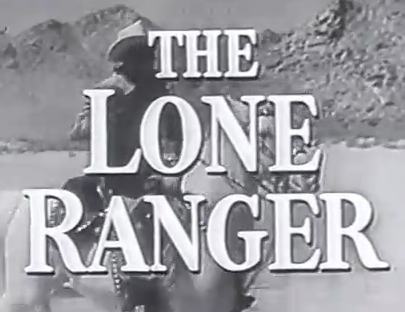
|
|
The Lone Ranger
Clayton Moore
The Lone Ranger is an American western television series starring Clayton Moore (John Hart from 1952 to 1954) and Jay Silverheels as Tonto. The live-action series initially featured Gerald Mohr as the episode narrator. Fred Foy served as both narrator and announcer of the radio series from 1948 to its finish and became announcer of the television version when story narration was dropped there. This was by far the highest-rated television program on the ABC network in the early 1950s and its first true "hit."
|
|
|
|
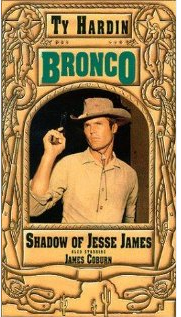
|
|
Bronco
Ty Hardin
"Ty Hardin (born in New York City, USA, on January 1, 1930) is a former actor best known as the star of the 1950s western television series Bronco. The name "Ty" is said to come from "Typhoon", a childhood nickname. Initially, he was billed as "Ty Hungerford," but soon his name was changed to Ty Hardin. When Clint Walker walked out on his ABC series Cheyenne in 1958 during a contract dispute with Warner Bros., Ty Hardin got his big break. Warner Bros. bought out Hardin's Paramount contract and installed him as Cheyenne's country cousin Bronco Layne for one season. Walker and Warner Bros. came to terms after the season ended, but Hardin had been such a big hit that the studio gave him his own series. Bronco alternated weeks with another Western, Sugarfoot. Bronco ran from 1958 through 1962. Later on Hardin was given a further series called On the Trail of Johnny Hilling, Boor and Billy which was immensely successful in Germany. Hardin was married to the 1961 Miss Universe Marlene Schmidt for four years. (1962-1966). They had one daughter.
|
|
|


































